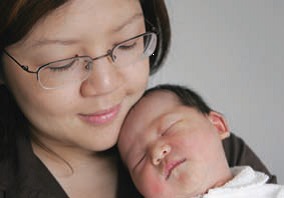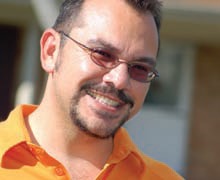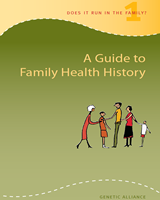All Genetic Alliance content, except where otherwise noted, is licensed under a Creative Commons Attribution License, which permits unrestricted use, distribution, and reproduction in any medium, provided the original work is properly cited.
NCBI Bookshelf. A service of the National Library of Medicine, National Institutes of Health.
Genetic Alliance. A Guide to Family Health History. Washington (DC): Genetic Alliance; 2006.
Information to collect
Who to collect information on:
- Yourself
- Your parents
- Your brothers and sisters
- Your children
Then move on to aunts, uncles cousins and grandparents.
Basic information to collect:
- Name and how you are related (myself, parent, child, etc.)
- Ethnicity, race, and/or origins of family
- Date of birth (or your best guess—for example “1940s”)
- Place of birth
- If deceased, age and cause of death
Collect stories about your ancestry and culture. This is a great chance to preserve your family’s memories.
You don’t have to collect everything!
Be sure to record age at onset of symptoms (when the disease started)
Health history:
- Alzheimer’s disease
- Asthma and allergies
- Birth defects (such as cleft lip, heart defects, spina bifida)
- Blindness/vision loss
- Cancer (such as breast, ovarian, colon, prostate)
- Current and past medications
- Deafness/hearing loss at a young age
- Developmental delay/learning disorders
- Diabetes/sugar disease
- Heart disease
- High blood pressure
- High cholesterol
- History of surgeries
- Immunizations
- Mental health disorders (such as depression, schizophrenia)
- Obesity
- Pregnancy (such as number of children, miscarriages, complications)
- Stroke
- Substance abuse (such as alcohol, drugs)
Lifestyle:
- Exercise
- Habits (such as smoking, drinking, regular doctor/ dentist checkup)
- Hobbies and activities
- Nutrition and diet
- Occupation
It is important to learn what you can.
How to collect
Talk to your family
Your relatives are the best source of information about your family. Family history is often shared while talking at family events like birthday parties, weddings, reunions, religious gatherings, holiday dinners, and funerals. These events provide a chance to ask family members about their lives.
Use what you have
Check first to see if your family has family trees, charts, or listings of family members. This information may be written in baby books, photo albums, birthday date books, a family bible or other religious records. Review your own medical history with your doctor to make sure you are not forgetting anything.
Plan an individual conversation
After you have brought up the idea of collecting your family health history, you may want to talk with certain family members to get a more complete record of what they know. If possible, record these talks so you can go over them later. This guide includes questions to ask.
Send a survey
You may wish to send out a survey asking for health information from relatives. One quick and easy way to collect this information is to put it in a holiday newsletter. Not everyone will feel comfortable filling out a survey. Be sure to explain exactly why you are asking questions.
Tips for collecting family health history
- Start with your parents if they are still living. Often, older relatives are good sources of information and can be the “family historian.”
- If you are adopted, you may be able to learn some of your family history through your adoptive parents. You may also ask to see the adoption agency records.
- It is important to respect others. Some relatives may not want to share their medical histories. Some may not know their family history.
- It can be scary to find out about a health concern in your family. Sharing family history with your healthcare provider can help you understand if you are at risk.
- Family members may not clearly identify all diseases. For example, someone who suffered from “the blues” may have had depression. Ask family members to talk about how relatives acted.
Lisa’s story

When I became pregnant, I talked with my parents about diseases that run in our family. I wanted to be prepared for anything that could affect my child. My parents told me that, before I was born, my aunt had a baby boy who seemed healthy. A few weeks later, however, he became very ill with vomiting and wasn’t eating. The doctor diagnosed him with a genetic disorder called MCADD (Medium Chain Acyl-CoADehydrogenase Deficiency) and put him on a special diet and medication. Unfortunately, some damage had already been done.
When I told my doctor this, she checked to see if MCADD was included in our state’s newborn screening program. Luckily, it was. When my daughter was born, we paid close attention to her newborn screening results. She too has MCADD, but we were able to start treatment right away. Now she is a healthly, active three-year-old. By learning about my family health history, I was able to ensure that my baby stayed as healthy as possible from the moment she was born.
To find out more about MCADD, visit www.fodsupport.org.
How to ask questions
On the next page is a list of questions that will help you talk with your family members. These questions will help you learn about your family stories, as well as health patterns and any impact environment, lifestyle, and family history may have on family health. Add your own questions that relate to your family.
Prepare ahead of time
- Write down what you know—such as family members’ names, where they were born, or how many children they have.
- Pick the questions you will ask ahead of time.
- Record the interviews on a tape recorder or video camera.
During the conversation
- Write down health-related information given by your relative.
- Try to keep the questions short. Avoid questions that can be answered with a simple “yes” or “no.”
- Use follow-up questions such as “why,” “how,” and “can you give me an example.”
- Do not expect people to know the answers to all of your questions.
- Respect a person’s wishes not to talk about certain topics.
- Ask your family member to show you pictures, recipes, letters, and other family keepsakes. These can help people remember details and lead to more family stories.
Try not to interrupt—let your family member tell his or her story!
Michael’s story

Since I am adopted, I thought there was no way for me to put together a family health history. Even though my adopted family and the adoption agency tried to help, they didn’t have the answers I needed about my birth family’s health. How can I have a family health history without having my questions answered?
There is something I can do. I am starting my family health history with me and my health issues—like the fact that I started wearing glasses when I was 12 years old. I will pass the information on to my children, and they will be able to add to our family history.
Sample questions
These questions are examples. You should change them to fit your conversation.
Questions about childhood
- Where were you born?
- Where did you grow up?
- Did you experience any health problems (for example, allergies) as a child?
- Do you have any brothers or sisters? Are they living? How old are they?
Questions about adulthood
- What jobs have you had? Can you tell me about a normal day?
- What was your work environment like?
- Do you have children? What are their names? When were they born? Did they have any health problems?
- What habits (sun exposure, physical activity, smoking, etc.) have you had that could have affected your health?
- Did you have any health problems as an adult? At what age? How was this treated (e.g. medicine, surgery)?
Questions about parents and grandparents
- When and where were your parents born? What do you know about them (for example, their jobs and hobbies)?
- When and where were your grandparents born? What do you remember about them?
- Did your parents or grandparents have any health problems?
- Do you know if your parents or grandparents took medicine on a regular basis? If so, for what? Did they use home remedies? What kinds and for what?
Questions about family life
- Has your family lived anywhere that caused them health problems (e.g. disaster areas, waste sites)?
- What foods does your family usually eat? Describe a typical family breakfast or dinner. Do you eat special foods for special occasions?
- Has anyone had problems in pregnancy or childbirth? What kinds of problems?
- Are there any diseases that you think might run in our family?
- Is there anything else you would like to tell me about your life or health concerns in our family?
- Collect - A Guide to Family Health HistoryCollect - A Guide to Family Health History
- txid2735769[Organism:noexp] (1481)Identical Protein Groups
- "Genome Diagnostics Laboratory, Amsterdam University Medical Cent... (16)"Genome Diagnostics Laboratory, Amsterdam University Medical Center"[submitter] AND "FGFR3"[gene]SearchClinVar
Your browsing activity is empty.
Activity recording is turned off.
See more...
